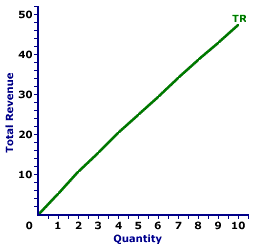
|
|
INJECTION-LEAKAGE MODEL: A model used in Keynesian economics based on the equality of non-consumption expenditures (or injections) and non-consumption uses of income (leakages). On one side of the equality is saving, taxes, and imports -- the non-consumption leakages. On the other side of the equality is investment, government purchases, and exports -- the non-consumption injections. The injection-leakage model provides an alternative to the Keynesian cross for identifying equilibrium aggregate output.
Visit the GLOSS*arama
|
|


|

|
                           TOTAL REVENUE CURVE, MONOPOLISTIC COMPETITION: A curve that graphically represents the relation between the total revenue received by a monopolistically competitive firm for selling its output and the quantity of output sold. It is combined with the total cost curve to determine economic profit and the profit maximizing level of production. The slope of the total revenue curve is marginal revenue. Monopolistic competition is a market structure with a large number of relatively small firms that sell similar but not identical products. Each firm is small relative to the overall size of the market such that it has some market control, but not much. In other words, it can sell a wide range of output at a narrow range of prices. This translates into a relatively elastic demand curve. If a monopolistically competitive firm wants to sell a larger quantity, then it must lower the price.The total revenue curve reflects the degree of market control held by a firm. For a perfectly competitive firm with no market control, the total revenue curve is a straight line. For firms with more market control, such as monopolistic competition, the slope of the total revenue curve flattens at larger quantities. The slope of this total revenue curve is marginal revenue. Total Revenue Curve,
Sandwich Style |  |
The total revenue curve for Manny Mustard's House of Sandwich is displayed in the exhibit to the right. Key to this curve is that Manny Mustard is a monopolistically competitive provider of Deluxe Club Sandwiches and thus faces a negatively-sloped demand curve. Larger quantities of output are only possible with lower prices.The vertical axis measures total revenue and the horizontal axis measures the quantity of output (number of sandwiches). Although quantity on this particular graph stops at 10 sandwiches of medicine, it could go higher. This curve indicates that if Manny Mustard's House of Sandwich sells 1 sandwich (at $5.25 per sandwich), then it receives $5.25 of total revenue. Alternatively, if it sells 10 sandwiches (at $4.75 per sandwich), then it receives $47.50 of total revenue. While the curvature is slight, the total revenue curve for monopolistic competition is not a straight line. While the curvature is slight, the total revenue curve for monopolistic competition is not a straight line. For Manny Mustard the total revenue curve has a slightly flatter slope as more output is produced. The changing slope of this curve is due to the changing price.

Recommended Citation:TOTAL REVENUE CURVE, MONOPOLISTIC COMPETITION, AmosWEB Encyclonomic WEB*pedia, http://www.AmosWEB.com, AmosWEB LLC, 2000-2025. [Accessed: July 1, 2025].
Check Out These Related Terms... | | | | | | | | |
Or For A Little Background... | | | | | | | | |
And For Further Study... | | | | | | | |
Related Websites (Will Open in New Window)... | | | |
Search Again?
Back to the WEB*pedia
|



|

|
GREEN LOGIGUIN
[What's This?]
Today, you are likely to spend a great deal of time wandering around the shopping mall seeking to buy either storage boxes for your computer software CDs or a set of tires. Be on the lookout for small children selling products door-to-door.
Your Complete Scope
This isn't me! What am I?
|

|
|
The 22.6% decline in stock prices on October 19, 1987 was larger than the infamous 12.8% decline on October 29, 1929.
|

|
|
"Experience keeps a dear school, but fools will learn in no other. " -- Benjamin Franklin
|

|
CPI
Consumer Price Index
|

|
|
Tell us what you think about AmosWEB. Like what you see? Have suggestions for improvements? Let us know. Click the User Feedback link.
User Feedback
|


|


